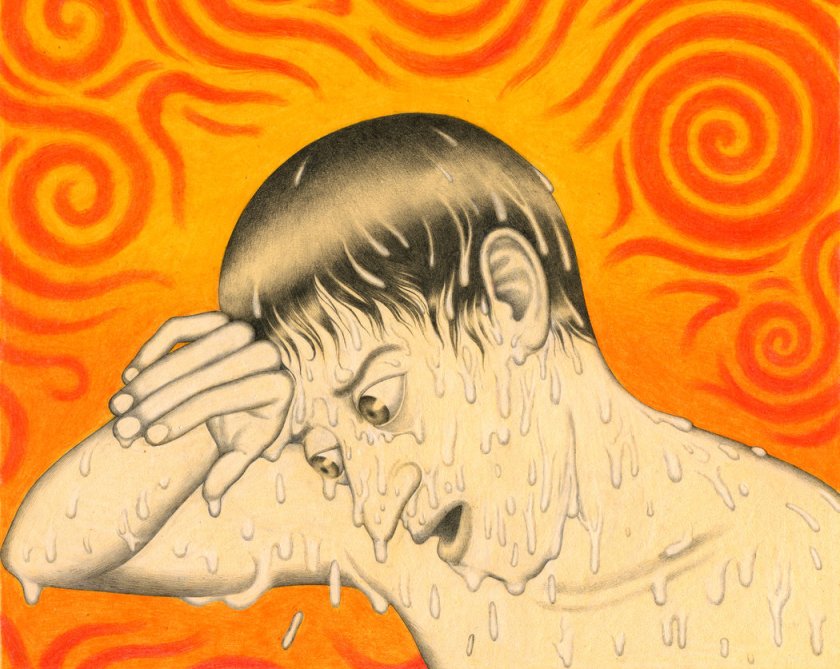
I’ve been a bit of a sloth lately. I don’t have a lot of energy or motivation to do much of anything. Some of it has to do with an upcoming event that we have literally been waiting months for and has lately monopolized my thoughts, (which I will write about soon), but most of it has to do with the weather.
I bitch and write about the heat and humidity every summer, primarily because the MS makes dealing with it infinitely worse, but we’re not soft up here in New England. We get our share of frigid temps in the winter and hot, humid days in the summer. But what is noteworthy about this recent stretch is how long it has lasted. We are heading into a second week of 90+ degree heat with a heat index sniffing and sometimes exceeding 100. We aren’t even through July, and this is shaping up to be one of the hottest summers on record, which has brought back some memories.
I moved in Evansville, Indiana in the mid 1990’s when a career opportunity arose, and lived there for three years before returning to Connecticut. I enjoyed my time there. The people were wonderful, the geography was significantly different but pretty in its own way as the lack of hills and trees created vistas of flat, open expanses. I loved the central time zone too, because I could usually watch whatever I wanted and still get to bed by 11, which allowed a full-night’s sleep. The only downside to living there were the summers.
If you look at the map of the United States, Indiana is shaped like the letter J, and Evansville is near the tip of that J, tucked along the banks of the Ohio River, in the southwest corner of the state bordering Kentucky and Illinois. For comparison’s sake, it’s longitude would be equivalent to the Virginia/North Carolina border to the east and Southern Nevada to the west. I was warned the summers were hot, but there was a world of difference between hearing that and experiencing it. I have NEVER lived in a place where the heat was that oppressive.
I have always preferred to sweat then freeze, but those summers took some getting used to. From most of Memorial Day to Labor Day, the daytime temps ranged from the mid to upper 80’s to triple digits, and it felt as if the humidity matched the temps. It is the only place I have ever lived where it felt hotter at 7PM than it was at 3PM. Being landlocked, the heat just kept building and building throughout the day, and venturing outdoors felt like walking into a furnace. The heat and humidity was almost suffocating. You’d burst into perspiration as soon as you stepped outside, and soon thereafter you felt like you were wrapped in a moist, hot, steaming blanket. It’s no wonder that part of the country gets horrific thunderstorms and tornados. The heat has nowhere to go.
How hot was it? In 1997 we built our first house, but had a falling out with the contractor and fired him before the roof was completed. To make a long story short, my father-in-law became the job site foreman, K took over the general contractor duties, and I spent whatever free time I had at the building site.
I took one week off in July to lend a hand and clean the site of all construction debris. Each day, I would arrive at seven, work until two or three, and typically bring two gallons of Gatorade with me because I knew I’d lose a lot of fluids and I didn’t want to get dehydrated or cramp up. I’d start guzzling drinking Gatorade around 8 or 9 in the morning, and finish both gallons before I left for the day. The sweat was leaving my body so quickly that I only emptied my bladder once in eight hours while consuming 256 ounces of liquid. When I returned to the apartment and sat after taking a cool shower, my body felt like a limp dishrag. I was completely wrung out.
On the plus side, while it did get chilly in the winter, the temperatures did not get below freezing very often, we didn’t get much snow, and I could spend a February afternoon outdoors and be very comfortable wearing jeans and a sweatshirt.
I enjoyed my time in Evansville, and still think wistfully of those days. We had some great experiences, but have no regrets about coming home, especially now that MS is my constant companion. The summers would have been devastating. If I’m having a hard time dealing with a New England heat wave, I can’t imagine what coping with the Evansville summers would be like. I’d have to be nocturnal, which isn’t practical, not to mention impossible if your job does not allow it.
I suppose I’d figure out a way and learn to cope, but still. There is heat, and there is Evansville heat. This got me to wondering how people in the midwest or deep south who have MS cope with the oppressively hot summers.
If you are out there reading this, I’d love to know.





You must be logged in to post a comment.